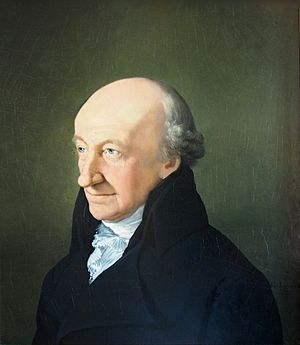Christoph Martin Wieland facts for kids
Christoph Martin Wieland (born September 5, 1733 – died January 20, 1813) was an important German poet and writer. He is best known for writing the first Bildungsroman, a type of novel about a character's journey of growing up and learning. His novel was called Geschichte des Agathon.
Wieland also wrote the epic poem Oberon. This poem later became the basis for Carl Maria von Weber's famous opera. Wieland believed in a "cosmopolitan" way of thinking. This means he thought people should be citizens of the world, not just one country. He famously said, "Only a true cosmopolitan can be a good citizen."
Contents
Early Life and Education
Christoph Martin Wieland was born in Oberholzheim, a small town in what is now Baden-Württemberg, Germany. His father was a pastor, a type of church leader. He made sure Christoph received a good education.
When he was twelve, Christoph went to the Kloster Berge gymnasium (a type of high school) near Magdeburg. He was a very smart child. By the time he left school in 1749, he had read many classic Latin books. He also knew the main French writers of his time.
In 1750, Wieland started studying law at the University of Tübingen. But he spent most of his time studying literature instead. His early poems were very religious and serious.
Literary Beginnings and Changes
Wieland's early poems caught the eye of Johann Jakob Bodmer, a Swiss writer. Bodmer invited Wieland to visit him in Zürich in 1752. Wieland stayed in Switzerland until 1760. For a year, he worked as a private tutor in Bern.
During this time, Wieland's writing style began to change. His early works were serious, but he soon started writing tragedies. These included Lady Johanna Gray (1758) and Clementina von Porretta (1760). He also wrote an epic poem called Cyrus (1759). This poem was inspired by the deeds of Frederick the Great, a famous king.
In 1760, Wieland returned to Biberach. He became the director of the chancery, a type of government office. His life there was made more interesting by his friendship with Count Stadion. Count Stadion had a large library filled with French and English books. Wieland also met his first love, Sophie Gutermann, again.
Important Works and Translations
Wieland's novel Geschichte des Agathon (1766–1767) was very important. It tells the story of a character's journey of self-discovery. This book helped create the modern psychological novel, which explores characters' thoughts and feelings.
Wieland also translated twenty-two of Shakespeare's plays into German prose. This was the first time Germans could read so many of Shakespeare's works. These translations helped introduce Shakespeare to the German people.
He then wrote many light and graceful poems. These included Musarion oder die Philosophie der Grazien (1768) and Der neue Amadis (1771). These poems were very popular. They offered a different style from the overly emotional writing of the time.
Wieland married Anna Dorothea von Hillenbrand in 1765. They had 14 children together.
Professor and Editor
From 1769 to 1772, Wieland was a professor of philosophy at the University of Erfurt. In 1772, he wrote Der goldene Spiegel oder die Könige van Scheschian. This book was a teaching story in the style of oriental tales.
This work caught the attention of Duchess Anna Amalia of Brunswick-Wolfenbüttel. She hired Wieland to be a tutor for her two sons in Weimar. Wieland lived in Weimar for most of the rest of his life. He also wrote opera librettos, which are the words for operas. These included Wahl des Hercules and Alceste.
In 1773, Wieland started a literary magazine called Der teutsche Merkur. He was its editor until 1789. This magazine became one of the most important literary reviews in Germany.
Wieland was a moderate liberal in his political views. He supported a government where a king or queen shared power with a parliament. He also believed in a free press.
Later Life and Legacy
One of Wieland's most famous later works is Die Abderiten, eine sehr wahrscheinliche Geschichte (1774). This book is a funny story about a fictional German town. It makes fun of small-town life in Germany.
His poetic masterpiece was the romantic epic Oberon (1780). He also created the singspiel (a type of German opera) Rosamunde in 1780.
Wieland also translated many ancient Greek and Roman works. These included Horace's Satires and Lucian's Works. He also edited a magazine called Attisches Museum. This magazine helped make Greek studies more popular.
Wieland had a strong influence on German literature during his time. He died in Weimar in 1813.
Images for kids
-
View of Schloss Warthausen by Johann Heinrich Tischbein (1781)
-
Former Komödienhaus in der Schlachtmetzig in Biberach an der Riss where in 1762, The Tempest (Shakespeare), translated by Christoph Martin Wieland was performed for the first time in Germany.
See also
 In Spanish: Christoph Martin Wieland para niños
In Spanish: Christoph Martin Wieland para niños
 | George Robert Carruthers |
 | Patricia Bath |
 | Jan Ernst Matzeliger |
 | Alexander Miles |






